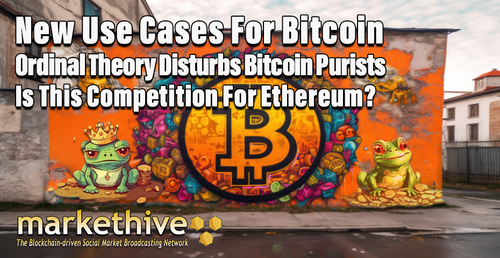


Image Source: Pixabay
How liquid staking can potentially harm the Ethereum ecosystem: HashKey report
HashKey Capital highlighted risks such as reduced competition, increased risk of censorship, decreased security and collusion by big players.
As it continues to grow, liquid staking brings considerable risks to the space and needs better decentralization, according to a report published by digital asset firm HashKey Capital.
According to the report, the overall liquid staking derivatives (LSD) market has surged to more than $22 billion in total value locked in 2023. In addition, the market capitalization of LSD projects has reached $18 billion.
While the growth of LSD protocols may be good for their respective communities and tokenholders, it also could be a double-edged sword. According to the report, it could harm the Ethereum ecosystem in various ways. Read More
Can Live Music NFTs Revive 'Cassette Culture' and Boost Indie Bands?
Solana music platform Vault’s latest initiative could elevate and support underground artists via exclusive NFT drops from live performances.
Crypto advocates see NFTs as a way to revitalize music ownership in the streaming era, and startup Vault is taking a particularly unique approach: using limited edition live concert recordings to revive the classic concept of “cassette culture,” and potentially benefit indie artists in the process.
Beginning this week, Vault’s “Cassette Culture 3.0” initiative is offering weekly drops of live recordings from underground and independent bands via its Solana-based NFT music platform. It’s designed to recall the approach by bands to create and distribute amateur recordings via cassette tapes to help build a following.
As it stands, 10 live recordings from bands performing at iconic New York venues including Baby’s All Right, Bowery Electric, and The Brooklyn Monarch are available to purchase as music NFT albums, with over 30 more artists already confirmed. Artists like Sid Simons, Sum Sun, and Charlotte Rose Benjamin are part of the initial lineup. Read More
What is Hooked Protocol, and how does it work?
For the uninitiated, the complexity of cryptocurrencies has been a steep barrier in onboarding. Hooked Protocol efficiently combines the learning of the cryptocurrency environment with GameFi.
The size of the global cryptocurrency market is set to rise to $13.18 billion by 2030, surging at a compound annual growth rate (CAGR) of 12.5% in the forecast period (2023–2030). However, despite the volume, the mainstream adoption of the technology is too slow.
Launched in late 2022, Hooked Protocol is a gamified social learning platform building an interactive and gamified on-ramp layer for new users to hop into the Web3 world. The focus is on encouraging massive Web3 adoption by onboarding users through education that is engaging and keeps the users hooked. Running on the BNB Smart Chain, the protocol also deploys the learn-and-earn concept.
As an experience-based Web3 education platform, Hooked Protocol opens the doors of the innovative Web3 ecosystem to a largely untapped audience. It seeks to resolve major challenges hindering Web3 adoption, namely the lack of adequate Web3 education and high barriers to entry. Through a gamified experience, one can learn how to acquire, hold, trade and profit from a cryptocurrency.
The protocol enables and accelerates the Web3 transformation of developers and applications. Capitalizing on decentralized social networks, it helps build a thriving community with scalability. Read More
FBI warns of phishing scams and social media account hijackers
The FBI warned that the account hijackers work to “create a sense of urgency” with their posts and urged people to vet any website or potential opportunity before clicking on it.
The United States Federal Bureau of Investigation (FBI) has warned of criminal actors hijacking social media accounts and posing as legitimate people in the nonfungible token (NFT) and crypto space.
It also raised concerns over spoof websites that dupe victims into thinking they are using legitimate platforms to steal their NFTs or crypto.
The warning comes as the number of victims having their funds drained from these two types of scamming methods continues to grow.
In an Aug. 4 public service announcement, The FBI urged people to be aware of “criminal actors posing as legitimate NFT developers in financial fraud schemes targeting active users within the NFT community.”
“Criminals either gain direct access to NFT developer social media accounts or create almost identical accounts to promote new NFT releases. Fraudulent posts often aim to create a sense of urgency, using phrases like ‘limited supply,’ and refer to the promotion as a ‘surprise’ or previously unannounced mint.” Read More

Bitcoin is evolving with the introduction of inscriptions, which has caused an explosion in innovation, creating new use cases for Bitcoin that many thought it would never advocate. Some believe these use cases are inappropriate for Bitcoin's primary mission of decentralizing money and being a store of value. These use cases include BRC-20 tokens, and Ordinal Inscriptions likened to an NFT called Digital Artifacts, and many are wondering whether they will compete with NFTs and ERC-20 tokens on Ethereum.
This article illustrates what Inscriptions, Ordinals, and BRC-20 tokens are, how they work, and evaluates what impact the Ordinal theory could have on BTC. Also, how will these protocols impact Ethereum? Could ETH lose NFT market dominance as a result? Read More
Elon Musk: 'We Never Will' Launch a Twitter or X Crypto Token
The blunt declaration came after the Tesla CEO replied to a warning about scam tokens claiming to be affiliated with his company.
After years of rampant speculation and frantic tea-leaf reading by cryptocurrency fans—and Dogecoin fans in particular—tech billionaire Elon Musk coldly put to rest any prospects of Twitter (or X) launching its own crypto token.
The news came not in a formal announcement, or even a Twitter post, but in a reply to another user.
"Elon Musk and 𝕏 never launched a crypto token," warned user @DogeDesigner—who has 240,000 followers and several past interactions with both Musk and now-CEO of X Linda Yaccarino. The tweet included an image of news article headlines falsely claiming that it had.
Musk replied with a stern one-liner: “And we never will.” Read More
Blockchain.Com Obtains Payments License From MAS
Blockchain.com, one of the earlier players and brands in the crypto exchange space, has secured a payments license from Singapore's regulatory body, the Monetary Authority of Singapore (MAS).
This move follows an in-principle approval granted to the platform in the previous year. With this license, Blockchain.com now joins a group of other service providers in the nation, which includes Circle, DBS Vickers, and Revolut.
MAS's decision to grant Blockchain.com its license signifies the evolving stance of regulatory bodies towards digital currencies and payment platforms. Licenses from entities like MAS are instrumental in validating a platform's adherence to regional financial and operational norms. For an industry often scrutinized for its transparency and security measures, such endorsements can be critical.
For platforms like Blockchain.com, having a MAS license can offer a level of operational assurance to its user base. Regulatory frameworks ensure platforms maintain a balance between innovation and user security. Read More
PayPal USD: Boon for Ethereum but not decentralization, says community
Proponents say PayPal’s PYUSD could see Ethereum become the money layer of the internet, while opponents argue that it’ll act like a poorly designed central bank digital currency.
PayPal’s new Ethereum-based stablecoin, PYUSD, has been seen as bittersweet news for the crypto community.
While it could finally see Ethereum find its place in mainstream adoption, it could also spell trouble for decentralization and personal control of assets, warns the community.
The new stablecoin, PayPal USD, was launched on Aug. 7 and is issued by Paxos Trust Co. — the firm behind Binance USD. It’s built on Ethereum and “designed for digital payments and Web3,” with the firm saying it will soon be available to United States customers.
The launch has been seen as a boon for Ethereum adoption. Ethereum bulls Anthony Sassano and Ryan Sean Adams believe the ERC-20 stablecoin will push the blockchain closer toward becoming the money layer of the internet. Read More
Two Ethereum Altcoins Leading New Resurgence of DeFi, According to Glassnode
Two coins from the Ethereum (ETH) ecosystem are leading the charge of a new resurgence in decentralized finance (DeFi), according to blockchain analytics firm Glassnode.
In a new report, Glassnode says that its DeFi index, which consists of the eight largest DeFi tokens by market cap, has outperformed Ethereum over the last two months for the first time since September 2022.
Zooming in on the index, Glassnode says that two tokens are standing out as the primary drivers of the trend: the stablecoin governance token Maker (MKR) and the native currency of the smart contract DeFi protocol Compound (COMP).
The firm says the strong performance of the two altcoins may be linked to recent fundamental developments for the two crypto projects.
“Upon closer examination, we can see that the performance may well be closely related to new project fundamentals, rather than wider market developments." Read More
Disclaimer: These articles are provided for informational purposes only. They are not offered or intended to be used as legal, tax, investment, financial, or any other advice.